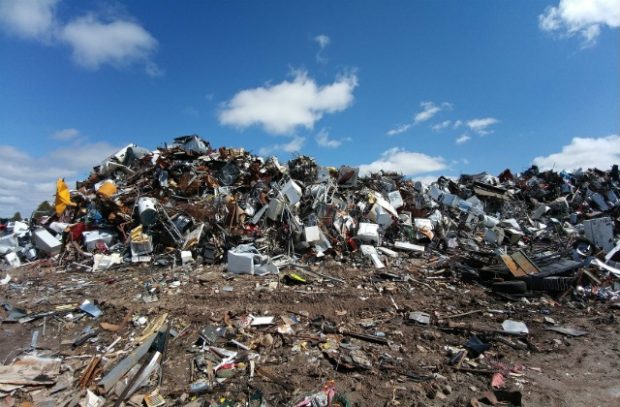
Defra has today published its latest statistics for fly-tipping in England, which show that local authorities are increasingly using their powers to fine and prosecute offenders.
According to the latest data which covers 2019/20, over 75,000 fixed penalty notices (FPNs) were issued for fly-tipping - an increase of 32% since 2016 when councils were given the power to issue fly-tipping FPNs. Prosecutions have also more than doubled over the same period, with total court fines last year totalling nearly £1.2 million.
Local authorities in England dealt with 976,000 fly-tipping incidents, with the most common size category being equivalent to a ‘small van load’ of waste (34% of total incidents), followed by the equivalent of a ‘car boot or less’ (28%).
Environment Minister Rebecca Pow said:
Fly-tipping is completely unacceptable, and these cynical offenders need to know that councils are taking increasing action and that they face on-the-spot fines of £400 or up to five years in prison if convicted in court.
Over 75,000 fixed penalty notices were issued in 2019/20 - an increase of 32% since 2016 – and prosecutions have more than doubled over the same period, with total court fines last year totalling nearly £1.2 million.
We are committed to tackling waste crime even further, but there is more that we must all do. Everyone has a legal duty of care when handling waste, and all householders and businesses must ensure that they pass their waste to licensed carriers, as failure to do so could result in a £400 fine.
Councils are able to issue on-the-spot fines to fly-tippers of up to £400 and can stop, search and seize vehicles suspected of being used for fly-tipping. Local authorities and the Environment Agency are also able to issue penalties of up to £400 to householders who do not pass their waste to a licensed carrier and whose waste is then found fly-tipped.
Fly-tippers can also be prosecuted and taken to court, which can lead to a significant fine and/or up to 12 months imprisonment if convicted in a Magistrates' Court or an unlimited fine and/or up to 5 years imprisonment if convicted in a Crown Court.
Fly-tipping prosecutions are highly successful, with over 98% of prosecutions resulting in a conviction in 2019/20.
The Environment Agency is also clamping down on waste crime and large-scale illegal dumping. Between 2017 and 2020, the Agency stopped illegal waste activity at 2,700 sites and initiated 191 prosecutions for illegal waste sites, with 39 prison sentences handed down. It also issued fines of over £1.1m for illegal waste sites, plus £5.5m in Proceeds of Crime Act confiscation orders.
In 2019/20 alone, the Agency prosecuted nearly 100 individuals and companies for waste crime offences, with fines exceeding £900,000, 28 custodial sentences and £1m of confiscation orders.
2019/20 statistics and comparisons
- In 2019/20, local authorities in England dealt with 976,000 fly-tipping incidents, an increase of 2% from the 957,000 reported in 2018/19.
- The number of fixed penalty notices (FPNs) issued in 2019/20 was 75,400, an increase of 32% (18,100) on 2016/17 (Total = 57,300). FPNs in 2019/20 were the second most common action (after investigations), and accounted for 16% of all actions in 2019/20.
- The number of prosecution actions has increased by 23% year-on-year, from 2,400 in 2018/19 to 2,944 in 2019/20, with an 87% (1,373) increase on 2016/17 (Total = 1,571).
- Over 98% of prosecutions in 2019/20 resulted in a conviction.
- The number of court fines issued has increased from 2,056 (30%) in 2018/19 to 2,671 in 2019/20, with the number of fines more than doubling since 2016/17 which stood at 1,318.
- The value of total fines increased to £1,170,000 in 2019/20. This is an increase of 7% on 2018/19 and 62% on 2016/17 when total value was £723,000.
- Just under two thirds (65%) of fly-tips involved household waste. Total incidents involving household waste were 632,000 in 2019/20, an increase of 7% from 588,000 in 2018/19.
- The most common place for fly-tipping to occur was on highways (pavements and roads), which accounted for over two fifths (43%) of total incidents in 2019/20. In 2019/20, the number of highway incidents was 419,000, which was an increase of 6% from 396,000 in 2018/19.
- The most common size category for fly-tipping incidents in 2019/20 was equivalent to a ‘small van load’ (34% of total incidents), followed by the equivalent of a ‘car boot or less’ (28%).
- In 2019/20, 33,000 or 3% of total incidents were of ‘tipper lorry load’ size or larger, which is a decrease of 8% from 36,000 in 2018/19. For these large fly-tipping incidents, the cost of clearance to local authorities in England in 2019/20 was £10.9 million, compared with £12.8 million in 2018/19.
1 comment
Comment by Ruth Griffiths posted on
THIS IS A CRIMINAL ACT & SHOULD BE TREATED AS SUCH .BBC REPORT SHOWED A TINY FRACTION OF THESE FLY TIPPERS WERE PROSECUTED & WITH PATHETIC FINES .STSART TAKING IT SERIOUSLY WITH PUNISNMENTS THAT PUT THEM OUT OF BUSINESS !